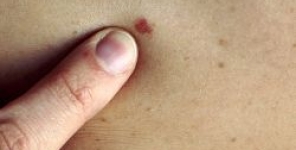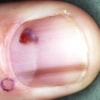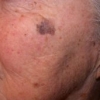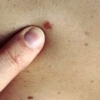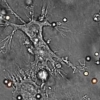Arthrophytum scoparium inibisce la melanogenesi attraverso la sotto-regolazione della tirosinasi e l'espressione di geni melanogenici nelle cellule di melanoma B16
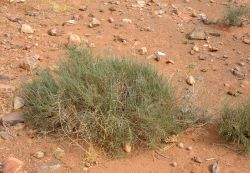 La melanina svolge un ruolo fondamentale nel proteggere la pelle dai raggi ultravioletti nocivi. Tuttavia, l'iperpigmentazione può portare a problemi e a disturbi estetici come le lentiggini solari (SL), il melasma, l'iperpigmentazione post-infiammatoria e anche al melanoma.
La melanina svolge un ruolo fondamentale nel proteggere la pelle dai raggi ultravioletti nocivi. Tuttavia, l'iperpigmentazione può portare a problemi e a disturbi estetici come le lentiggini solari (SL), il melasma, l'iperpigmentazione post-infiammatoria e anche al melanoma.
L'Arthrophytum scoparium cresce nel deserto, nella regione del Nord Africa, e per questo ambiente A. scoparium mostra degli ottimi adattamenti tra cui l'immagazzinamento dell'acqua e la produzione di utili fattori bioattivi. In questo studio, è stato indagato l'effetto dell'estratto di etanolo da A. scoparium (ASEE) sulla regolazione della melanogenesi nelle cellule di melanoma murino B16.
Le cellule trattate con lo 0.017% (w/v) di ASEE hanno mostrato una significativa inibizione della biosintesi della melanina in un modo dipendente dal tempo senza sviluppare citotossicità. Per chiarire il meccanismo alla base della regolazione della melanogenesi trattata con ASEE, è stata determinata l'espressione dell'enzima tirosinasi e dei geni correlati con la melanogenesi. I risultati hanno mostrato che l'espressione dell'enzima tirosinasi è stato significativamente diminuito e le espressioni in mRNA di Tyr, Trp-1, Mitf e Mc1R sono state significativamente sotto-regolate.
L'analisi LC-ESI-TOF-MS dell'estratto ha identificato la presenza di sei composti fenolici: acido cumarico, acido cinnamico, crisoeriolo, cianidina, catecolo e acido caffeilchinico. L'effetto inibitorio di ASEE sulla melanogenesi può quindi essere attribuito al suo contenuto derivativo di catecolo e tetraidroisochinolina.
Riportiamo qui come ASEE può inibire la melanogenesi in un modo dipendente dal tempo, diminuendo la proteina tirosinasi e le espressioni mRNA di Tyr, Trp-1, Mitf e Mc1R. Questo è il primo studio sull'effetto antimelanogenico di A. scoparium e sul suo potenziale come agente sbiancante.
Storia della pubblicazione:
Titolo: Arthrophytum scoparium inhibits melanogenesis through the down-regulation of tyrosinase and melanogenic gene expressions in B16 melanoma cells
Rivista: Experimental Dermatology. doi: 10.1111/exd.12089
Autori: Hui-Chia Chao, Hanen Najjaa, Myra O. Villareal, Riadh Ksouri, Junkyu Han, Mohamed Neffati, Hiroko Isoda
Affiliazioni: Graduate School of Life and Environmental Sciences, University of Tsukuba, Ibaraki, Japan
Institute of Arid Region, Medenine, Tunisia
Alliance for Research on North Africa (ARENA), University of Tsukuba, Ibaraki, Japan
Laboratoire des Plantes Extrêmophiles, Centre de Biotechnologie à la Technopole de Borj-Cédria(CBBC), Hammam-lif, Tunisia
Abstract:
Melanin performs a crucial role in protecting the skin against harmful ultraviolet light. However, hyperpigmentation may lead to aesthetic problems and disorders such as solar lentigines (SL), melasma, postinflammatory hyperpigmentation and even melanoma. Arthrophytum scoparium grows in the desert in the North African region, and given this type of environment, A. scoparium exhibits adaptations for storing water and produces useful bioactive factors. In this study, the effect of A. scoparium ethanol extract (ASEE) on melanogenesis regulation in B16 murine melanoma cells was investigated. Cells treated with 0.017% (w/v) ASEE showed a significant inhibition of melanin biosynthesis in a time-dependent manner without cytotoxicity. To clarify the mechanism behind the ASEE-treated melanogenesis regulation, the expressions of tyrosinase enzyme and melanogenesis-related genes were determined. Results showed that the expression of tyrosinase enzyme was significantly decreased and Tyr, Trp-1, Mitf and Mc1R mRNA expressions were significantly down-regulated. LC-ESI-TOF-MS analysis of the extract identified the presence of six phenolic compounds: coumaric acid, cinnamic acid, chrysoeriol, cyanidin, catechol and caffeoylquinic acid. The melanogenesis inhibitory effect of ASEE may therefore be attributed to its catechol and tetrahydroisoquinoline derivative content. We report here that ASEE can inhibit melanogenesis in a time-dependent manner by decreasing the tyrosinase protein and Tyr, Trp-1, Mitf and Mc1R mRNA expressions. This is the first report on the antimelanogenesis effect of A. scoparium and on its potential as a whitening agent.
